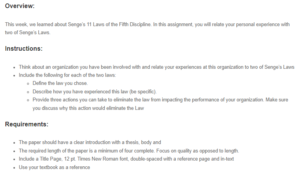Senge’s System Laws
According to Senge (2006), the 11 laws delve into system approaches applied to solving organizational problems. A systems approach is a holistic way of solving problems. Failure to use the systems approach may lead to some solutions amplifying the problems, and the result may be catastrophic in the long run. On the other hand, adopting a holistic approach involves leveraging the interconnectedness between systems to solve complicated problems. Senge’s laws recommend that the solutions to different situations should incorporate a systems-oriented problem-solving mindset. This essay seeks to show how two of Senge’s laws relate to my personal experience and actions that can be taken to eliminate the law from impacting the
performance of my organization.
Senge’s Laws that Relate to My Personal Experiences
Today’s Problems are a Result of Yesterday’s Solutions
One of Senge’s laws of the fifth discipline that relates to my personal experiences is that ‘today’s problems are a result of yesterday’s solutions.’ The primary argument under this law is that effective problem-solving should alleviate the problem completely and not shift it to another part of the system (Agyepong et al., 2012). For instance, if law enforcers crack down on narcotics on one street and transfer the supply to another, that is not an effective solution. Organizations that fail to look at the ramifications of a solution because it is a quick fix suffer in the long run.
While working as an operating manager at Barnabas Professional School, Michigan, I tried my best to ensure supplies arrived on time. The more I pushed suppliers to deliver supplies on schedule, the later they arrived. I realized I needed to personally engage suppliers in order to create workable schedules. Subsequently, one of the ways to curb what is stated in this law is by having realistic goals and ensuring that the same people work on a problem to the end. Furthermore, the relevant stakeholders need to take time to address their followers’ problems fully.
The Harder you push, the Harder Systems Push Back
Another fascinating law from Senge’s list of 11 laws is that ‘the harder you push, the harder systems push back.’ The law means that the harder one tries to apply a specific solution to the system, the system resists the change, leading to a phenomenon known as compensative feedback (Hansen et al., 2020). A classic real-life situation representing the law is when the US government tried constructing decent housing for low-income earners in the 1960s (Senge, 2006). Another positive attempt was the provision of scholarships to boost the skill level in the neighborhoods. However, these initiatives failed since more people from rural areas and other low-income areas migrated to the benefiting cities, leading to the solution not working.
Following this, I experienced compensative feedback while working as an operating manager at Barnabas Professional School, Michigan, especially in the kitchen department. I had tried overstocking stores to avoid the uncertainties of untimely deliveries, but I realized this was encouraging resource misuse. The kitchen staff had a tendency to cook more than needed when there was a surplus in stores.
According to Monat and Gannon (2023), one way to eliminate the compensating feedback is by engaging systems and habits thinking. Engaging in system thinking means understanding and sticking by the variables that work for a problem. There is also a need to practice patience and believe in organic solutions. Additionally, avoiding quick and forceful solutions would alleviate the problem.
Conclusion
Senge’s 11 laws encourage systems thinking when dealing with problems. There is a need to embrace adaptive ways to deal with different situations based on the reigning circumstances. Most importantly, Senge’s law encourages the avoidance of quick fixes that may fail in the long run and instead embraces effective, gradual solutions.
References
Agyepong, I. A., Kodua, A., Adjei, S., & Adam, T. (2012). When “solutions of yesterday become problems of today”: crisis-ridden decision making in a complex adaptive system (CAS)—the Additional Duty Hours Allowance in Ghana. Health Policy and Planning, 27(suppl_4), iv20–iv31. https://doi.org/10.1093/heapol/czs083
Hansen, J. Ø., Jensen, A., & Nguyen, N. (2020). The responsible learning organization: Can Senge (1990) teach organizations how to become responsible innovators? The learning organization, 27(1), 65-74.
Monat, J. P., & Gannon, T. F. (2023). The Meaning of “Structure” in Systems Thinking. Systems, 11(2), 92.
Senge, P. M. (2006). The fifth discipline: The art and practice of the learning organization. Broadway Business.
ORDER A PLAGIARISM-FREE PAPER HERE
We’ll write everything from scratch
Question

Senge’s System Laws
Overview:
This week, we learned about Senge’s 11 Laws of the Fifth Discipline. In this assignment, you will relate your personal experience with two of Senge’s Laws.
Instructions:
- Think about an organization you have been involved with and relate your experiences at this organization to two of Senge’s Laws
- Include the following for each of the two laws:
- Define the law you chose.
- Describe how you have experienced this law (be specific).
- Provide three actions you can take to eliminate the law from impacting the performance of your organization. Make sure you discuss why this action would eliminate the Law
Requirements:
- The paper should have a clear introduction with a thesis, body and
- The required length of the paper is a minimum of four complete. Focus on quality as opposed to length.
- Include a Title Page, 12 pt. Times New Roman font, double-spaced with a reference page and in-text
- Use your textbook as a reference


